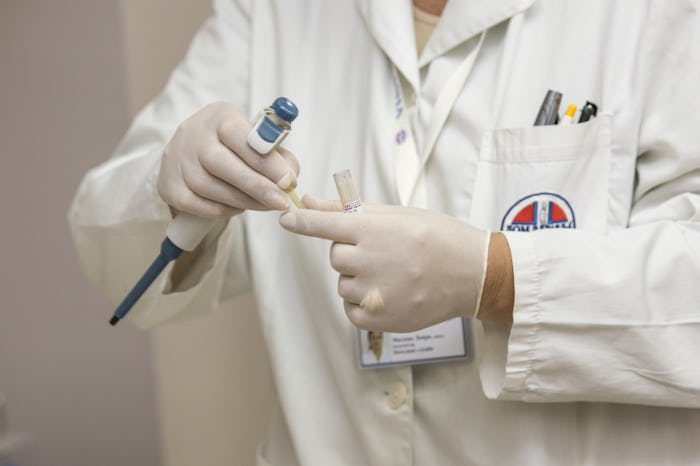Few current topics are more divisive than the safety of vaccines. Parents who are against vaccinating their children, or anti-vaxxers, may be confusing to those who favor the benefits of herd immunity. So if you’ve ever wondered why people are anti-vaxx, here are a few common reasons.
Anti-vaxxers are often concerned about the potential side effects of the numerous vaccinations that babies receive. Distrust of the pharmaceutical industry, as well as a preference for a more “natural” lifestyle, are also common components of the movement. However, the anti-vaxxer’s desire to prevent potential negative consequences in their own children may lead to major health concerns for many people.
According to Mother Jones, many states allow parents to opt out of vaccinating their children based on personal beliefs, religious beliefs, or medical exemptions. However, as the leniency in vaccinations continues, the dangers of very serious diseases grows. As explained in the Huffington Post, a recent increase in the prevalence of measles and whooping cough is directly correlated to the refusal of vaccines. Both diseases are preventable with vaccination. So why do anti-vaxx parents continue to hold their ground despite the dangers of these major diseases? The concern for their children is understandable, but many of their reasons for opting out of vaccinations are not based on science.
1Concern About Side Effects
Some individuals do experience side effects from vaccinations. According to the Centers for Disease Control and Prevention (CDC), most reactions are mild, such as soreness at the injection area or a slight fever. As further explained by the CDC, serious allergic reactions to any vaccine are very rare and occur in fewer than one in a million doses. And as reported in the BBC, most experts agree that the benefits of vaccination outweigh the slight risks of allergic reactions.
2Fear Of "Big Pharma"
Wariness of corporations is another factor. As explained in National Geographic, many members of the anti-vaccine movement have an "intense distrust of Big Pharma—the multinational pharmaceutical companies that manufacture vaccines." Anti-vaxxers do not trust the powerful companies to make decisions in the best interest of consumers.
3Preference For Homeopathy
The distrust for "Big Pharma" often goes hand-in-hand with anti-vaxxer's preference for homeopathy. However, many natural remedies have not been tested in peer-reviewed studies, and some practitioners have been accused of promoting myths about vaccines. For example, as reported in The Globe and Mail, a homeopathic college was criticized because it "promoted unscientific, false claims about the dangers of vaccines, and advocates the use of ineffective alternatives called nosodes." Alternatives to traditional medication often lack rigorous scientific study.
4The Autism Link That Never Was
The idea that vaccines lead to autism has persisted in the anti-vaxx crowd for a long time. That's thanks mostly to a now debunked 1998 study by Dr. Andrew Wakefield, who, according to The New York Times, conducted the study using funds from laywers of families seeking ot sue vaccine makers. admitting to . However, as explained by the Committee for Skeptical Inquiry (CSI), a New York-based organizaiton that "promotes scientific inquiry, critical investigation, and the use of reason in examining controversial and extraordinary claims," scientific study has proven that vaccines are safe, and do not cause autism. As CSI further explained, this may be a case of confusing causation with correlation; the autism "epidemic" is likely not related to vaccines, but rather an expansion of the diagnosis.
5Concern About Vaccine Overload
Some anti-vaxxers worry about the effects of giving their children too many vaccines at a young age. According to a 2015 piece in Vaccine, some parents fear that many injections "may overload the child's developing immune system and leave him or her susceptible to secondary infections." However, a piece in Pediatrics reported studies prove the immune system can respond to a large numbers of antigens, and thus it's unlikely multiple vaccines will weaken a child's immune system.
6Vaccines Are Unnatural
Some parents get caught up on the idea that vaccines are inherently unnatural, and therefore dangerous. However, according to the CDC, "your child’s immune system produces immunity following vaccination the same as it would following 'natural' infection with a disease. The difference is that the child doesn’t have to get sick first." By using an inactivated vaccine, children can safely develop immunity without getting sick.
7Desire To Keep Children Healthy
Overall, anti-vaxxers are acting out of a desire to keep their children healthy, and they believe avoiding vaccines is one way to preserve their kid's health. As explained in Time, some researchers have the idea that educating anti-vaxx parents about the dangers of diseases such as measles and rubella is one way to get more children inoculated against these diseases.
